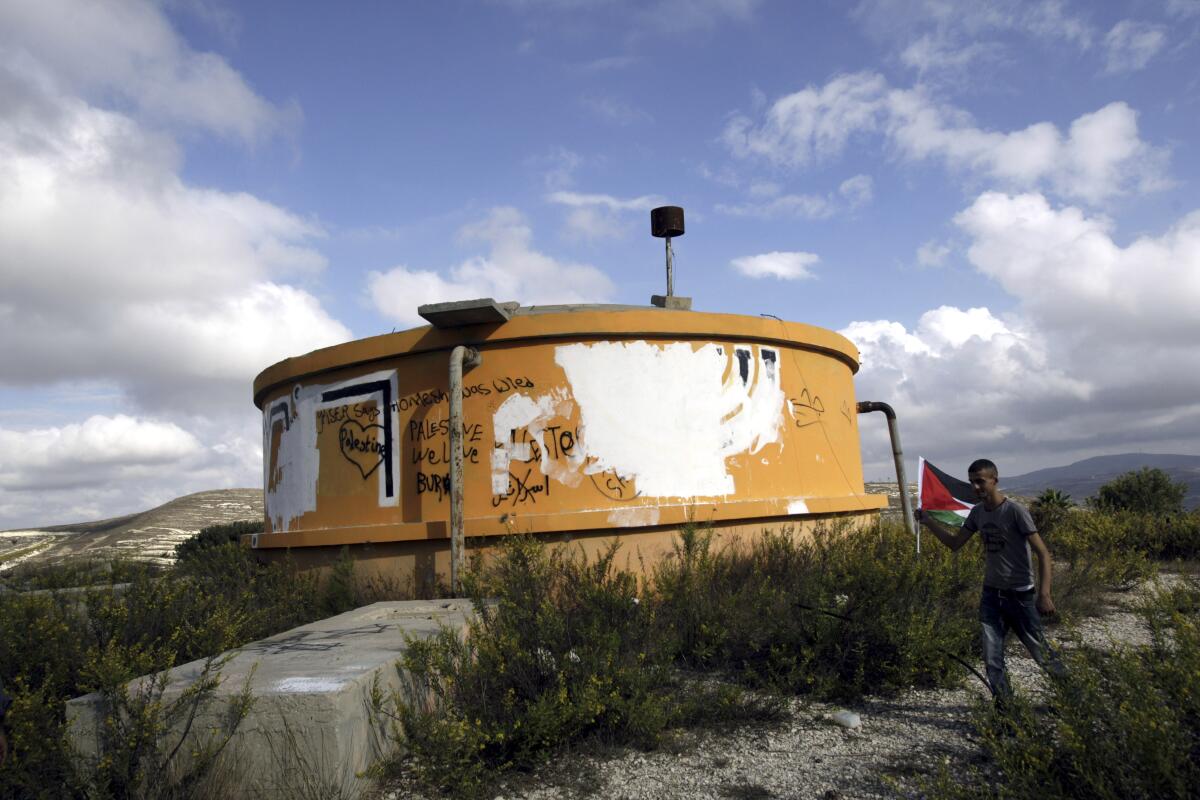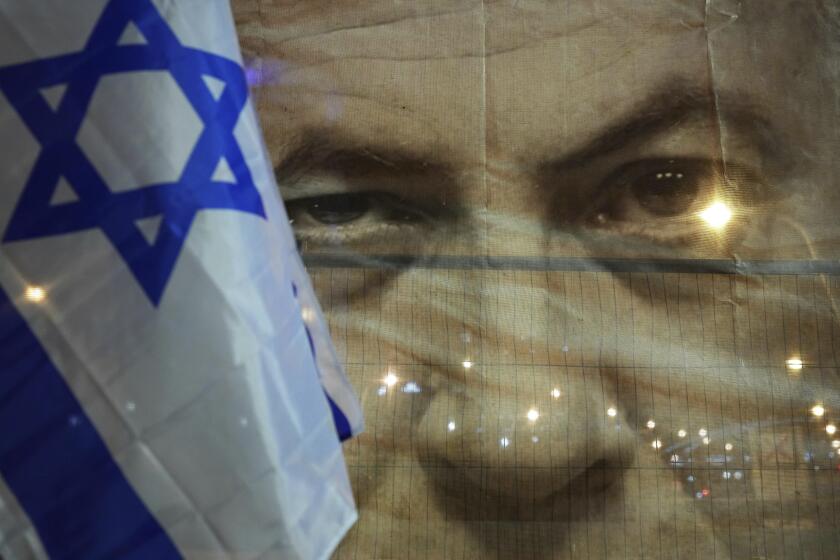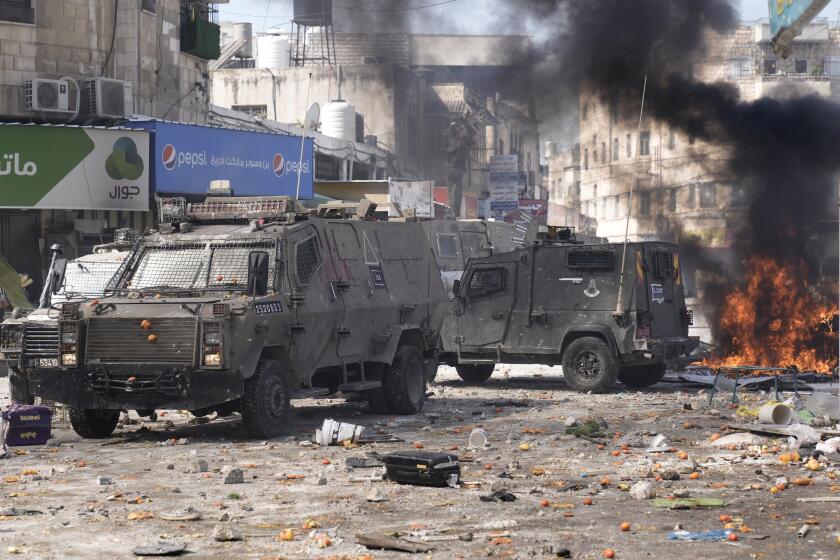Israel repeals 2005 act on West Bank settlement pullout

- Share via
JERUSALEM — Israeli lawmakers on Tuesday repealed a 2005 act that saw four Jewish settlements in the occupied West Bank dismantled at the same time as Israeli forces withdrew from the Gaza Strip. The development could pave the way for an official return to the abandoned West Bank areas in another setback to Palestinian hopes for statehood.
It was the latest move by Prime Minister Benjamin Netanyahu’s far-right government, which is dominated by settler leaders and allies, to promote settlement expansion in the territory, inflaming tensions with the Palestinians and the international community.
The move drew a sharp rebuke from Israel’s closest ally, the United States. Most of the international community considers settlements illegal and opposes construction on occupied territories claimed by the Palestinians for a future independent state. The State Department said it was “extremely troubled” and urged Israel to refrain from allowing settlers to return to the outposts.
“Coming at a time of heightened tensions, the legislative changes announced today are provocative and counterproductive to efforts to restore some measures of calm,” said State Department spokesperson Vedant Patel.
President Biden spoke with Israeli Prime Minister Benjamin Netanyahu to express “concern” over his government’s planned overhaul of the country’s judicial system.
Angry condemnation also poured in on Tuesday from the U.S. and several other countries over the of latest in a string of incendiary comments about the Palestinians by Israel’s ultranationalist finance minister, Bezalel Smotrich. Earlier this week, Smotrich claimed there is “no such thing” as Palestinians, sparking widespread outrage.
Israel evacuated the four settlements and unilaterally pulled out of Gaza under the 2005 legislation. The prime minister at the time, Ariel Sharon, argued that Israel would not be able to keep the settlements under a future agreement with the Palestinians.
Since then, Israeli citizens have been officially banned from returning to those locations, though the Israeli military has allowed activists to visit and pray there — a ban that has now been revoked.
Netanyahu’s government has put settlement expansion at the top of its agenda and has already advanced thousands of new settlement housing units and retroactively authorized nine wildcat outposts in the West Bank.
This week, Israel pledged to put a temporary freeze on further settlement approvals, including authorization of outposts, as part of a series of measures meant to ease tensions ahead of the sensitive period that includes the Muslim holy month of Ramadan and the Jewish holiday of Passover.
An Israeli minister says there’s ‘no such thing’ as a Palestinian people even as Israel and the Palestinian Authority try to reduce tensions.
Still, ultranationalist members of Netanyahu’s coalition pushed for a repeal of the ban on the northern West Bank settlements. The legislation passed in an overnight vote 31-18 in the 120-seat Knesset. The remaining lawmakers did not vote.
Itamar Ben-Gvir, an ultranationalist West Bank settler now serving as minister in charge of police, said Tuesday that the repeal of the ban corrects “a historic injustice” and pledged to continue boosting settlements.
The Palestinians seek the West Bank and Gaza Strip as an independent state, with east Jerusalem as its capital. Israel captured those territories in the 1967 Six-Day. Since then, more than 700,000 Israelis have moved into dozens of Jewish settlements in the West Bank and east Jerusalem — and most of the world considers them an obstacle to peace.
The vote came as Netanyahu’s government is pushing ahead with a separate plan to overhaul the country’s judicial system that has roiled Israeli politics. Netanyahu’s allies claim the courts have too much power in the legislative process and that the Supreme Court is biased against settlers. Critics say the overhaul would upend the country’s delicate system of checks and balances and push Israel toward authoritarianism. They also say Netanyahu could find an escape route from his corruption trial through the overhaul.
Tens of thousands of Israelis have poured into the streets each weekend to protest changes Netanyahu and his coalition are planning that opponents believe will curtail civil liberties.
The political crisis has divided the country and extended to the military, Israel’s most trusted institution, where many reservists have pledged not to show up for duty under what they see as impending regime change. On Tuesday, protest leaders escalated their calls for troops to refuse to serve in the military reserve on which Israel’s army relies.
“It’s a very hard day for us today, and our voices are shaking because we want to take our battle against the government one step forward,” said Lt. Col. Ron Sharf, a volunteer reservist. “Our government wants unlimited power.”
The threat of losing military personnel, particularly as tensions surge in the occupied West Bank, has sparked concern and condemnation. Netanyahu on Tuesday visited a military recruitment center in central Israel and appeared to warn new conscripts against joining the protests.
“We have no country without soldiers who are willing, recruited for service,” he said.
As the government faces mass protests over the judicial overhaul, documents leaked Tuesday show top finance ministry officials expressing concern that efforts to curb the Supreme Court’s independence could damage Israel’s economy, making the country less attractive to foreign investors and driving down its credit ratings.
Smotrich responded defiantly to the reports, seeking to assure the public that the judicial overhaul would not endanger the country’s prosperity.
Israel and the Palestinians pledge to take a series of steps to lower tensions ahead of a holiday season that includes both Ramadan and Passover.
“I am convinced that the reform will offer great opportunities for the Israeli economy,” he said. “Citizens, be calm, you are in good and professional hands.”
Tuesday’s repeal comes against the backdrop of the worst Israeli-Palestinian fighting in recent years and as concerns grow of intensified violence during Ramadan, which will begin on Thursday.
Israeli forces have carried out almost nightly arrest raids across the occupied West Bank over the past year. The incursions began after a string of deadly attacks in Israel last spring and have provoked a fierce response from Palestinians.
So far this year, 85 Palestinians have been killed by Israeli fire, and Palestinian attackers have killed 15 Israelis, according to a tally by the Associated Press.
Israel says most of the Palestinians killed have been militants. But stone-throwing youths protesting the incursions and people not involved in the confrontations have also been killed. All but one of the Israelis killed were civilians.
On Tuesday, the U.S., France, Saudi Arabia and the United Arab Emirates joined mounting criticism of Smotrich’s remarks earlier this week denying the existence of the Palestinian people.
The rapprochement between longtime rivals Saudi Arabia and Iran sent shock waves through the Middle East and dealt a symbolic blow to Israel’s leader.
“There is no such thing as a Palestinian nation. There is no Palestinian history. There is no Palestinian language,” Smotrich said in a speech in Paris. French Foreign Ministry spokeswoman Anne-Claire Legendre lambasted his remarks as “infuriating and irresponsible.”
The State Department described his comments as “deeply concerning and dangerous.”
“The U.S. remains committed to two states for two people, both of whom had deep ancient roots in the land,” Patel said.
Saudi Arabia denounced what it called Smotrich’s “offensive and racist statements,” which it said “contribute to spreading hate speech and violence and undermine efforts for dialogue and international peace.”
The kingdom does not have formal diplomatic ties with Israel.
The UAE, which established full diplomatic relations with Israel in 2020 as part of the U.S.-brokered Abraham Accords, stressed “the need to confront hate speech and violence.”
Associated Press writers Isabel DeBre and Isaac Scharf in Jerusalem, Matt Lee in Washington and Jon Gambrell in Dubai, United Arab Emirates, contributed to this report.
More to Read
Sign up for Essential California
The most important California stories and recommendations in your inbox every morning.
You may occasionally receive promotional content from the Los Angeles Times.















